Want the best collaborative writing tools for research? Our blog post lists the top choices for more efficient, productive teamwork.
In today’s fast-paced, interconnected world, collaborative writing has become a necessary skill for research teams. With multiple people working on a project, it’s crucial to have tools that facilitate effective communication and collaboration, ensuring that everyone stays on the same page.
Collaborative writing tools provide an efficient way for researchers to work together, share ideas, and create well-structured documents. In this blog post, we will be introducing you to these tools, examining their features, and discussing the pros and cons that come with their use.
Table of Contents
Overview
Collaborative writing tools are software applications designed to make it easier for people to work together on research projects and other writing tasks. They provide a platform where researchers can edit, share, and review documents in real time, allowing them to develop well-organized and structured documents efficiently.
In this blog post, we will explore some of the best tools for research collaboration, discussing what each tool has to offer and the pros and cons associated with them.
Best Collaborative Writing Tools for Research
[Featured] Jasper AI: Best for AI-Assisted Writing and Unified Researcher Voices

Summary
- AI-powered writing assistant with research integration
- Google search integration for easy access to information
- Brand Voice feature to align multiple researchers’ writing styles
Jasper AI is an advanced artificial intelligence writing assistant designed to help users create high-quality content effortlessly. Apart from the usual features of a writing tool, Jasper AI offers powerful AI-driven features that make it perfect for researchers working on collaborative projects.
One of the standout features is its integration with Google search, which allows users to access information and research data quickly. This feature helps users save time and effort on manual searching, enabling them to focus on writing and collaboration.
Another notable feature is the Brand Voice, which allows multiple researchers to align their writing styles and maintain a consistent tone across the project. This is especially useful for teams working on larger research papers or projects where maintaining a unified voice is crucial.
What are the pros and cons of Jasper AI?
✅ Pros
- AI-assisted writing for improved content quality
- Integration with Google search for quick access to information
- Brand Voice feature for consistent tone and style
- Collaborative features for seamless teamwork
❌ Cons
- Requires subscription for premium features
- Might have a learning curve for new users
- Dependent on the internet connection for AI functionalities
Jasper AI is an excellent choice for researchers looking for a collaborative writing tool with advanced AI features. Its integration with Google search and Brand Voice feature make it a unique and powerful option for research teams working on projects that require both seamless collaboration and a consistent writing style.
#1. Google Docs: Best for Seamless Collaboration and Ease of Use
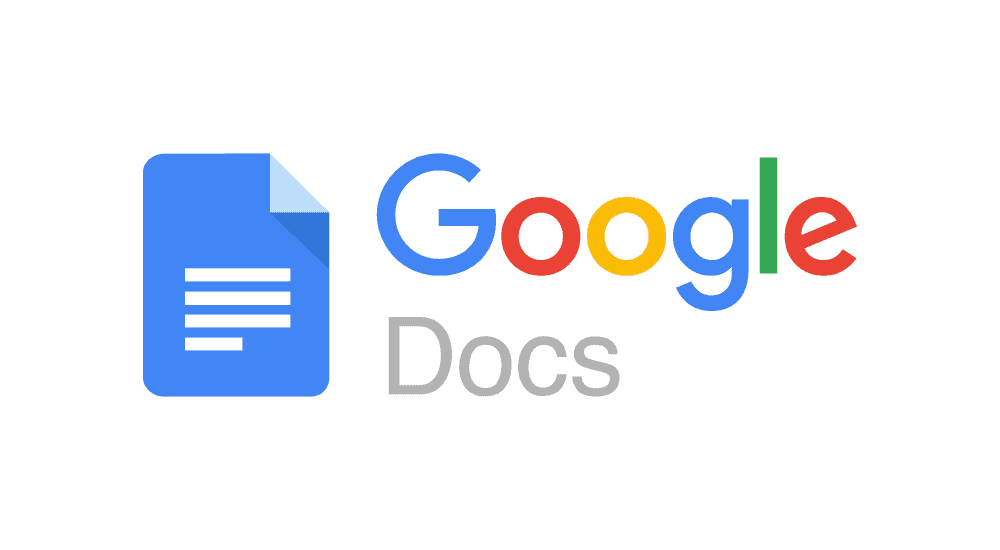
Summary
- Online, free-to-use document editor that enables smooth teamwork
- Accessible from various devices
- Wide range of formatting tools available
Google Docs is a popular online word processor that allows users to create, edit, and store documents. One of the main draws for researchers is Google Docs’ smooth teamwork features, allowing multiple users to work on the same document seamlessly.
With built-in chat and commenting functionalities, researchers can easily communicate while working together on a piece of writing.
What are the pros and cons of Google Docs?
✅ ✅ Pros
- Seamless teamwork and document sharing capabilities
- Built-in chat and commenting tools
- Extensive formatting options and add-ons available
❌ Cons
- Requires an internet connection for full functionality
- Limited features compared to dedicated writing programs
- May have privacy concerns for sensitive documents
Google Docs is a versatile and user-friendly tool for collaborative writing in research. Its seamless teamwork and communication features make it an excellent option for teams that need to work together on a project.
Source: https://www.google.com/docs/about/
#2. Microsoft Word Online: Best for Familiarity and Integration with Office Suite
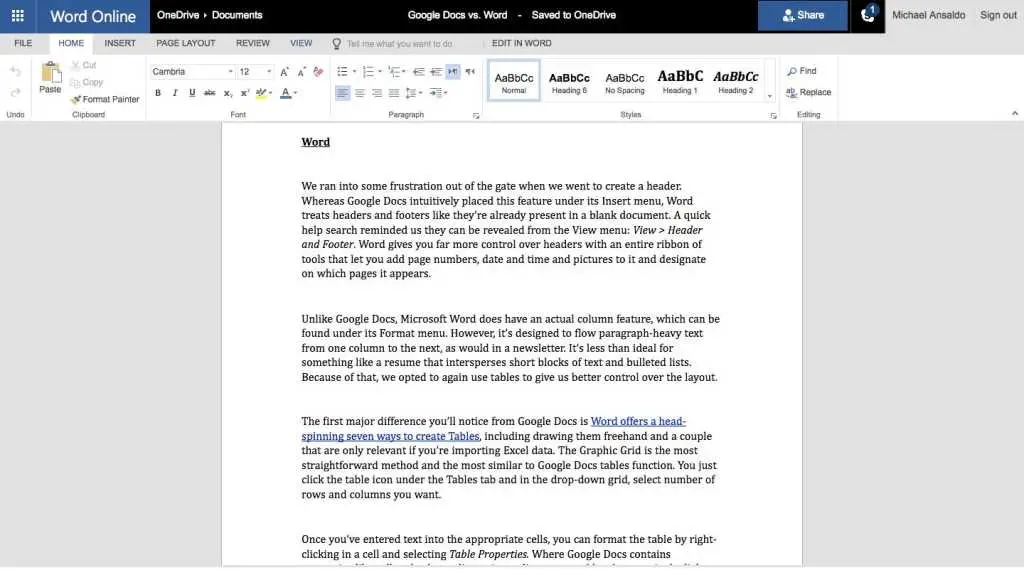
Summary
- Online version of Microsoft Word with familiar interface and features
- Convenient collaboration and document sharing
- Integration with other Microsoft Office applications
For those already familiar with Microsoft Word, transitioning to Microsoft Word Online is a seamless experience.
As an online version of the popular word processor, it provides the same set of features as the desktop application, with the added benefit of convenient collaboration and the ability to access documents from anywhere.
What are the pros and cons of Microsoft Word Online?
✅ ✅ Pros
- Familiar interface and features for MS Word users
- Convenient collaboration and document sharing opportunities
- Integration with other Microsoft Office applications
❌ Cons
- Requires an internet connection for full functionality
- May be less feature-rich than the desktop version
- Requires an Office 365 subscription for full access to features
Microsoft Word Online offers users a familiar environment to work in, with the added benefit of collaboration features.
It is an ideal choice for researchers who are accustomed to using Microsoft Word and want to continue working in a familiar setting with added collaborative capabilities.
Source: https://www.microsoft.com/en-ww/microsoft-365/word?ms.officeurl=word&rtc=1
#3. Dropbox Paper: Best for Minimalist Design and Integration with Dropbox Services
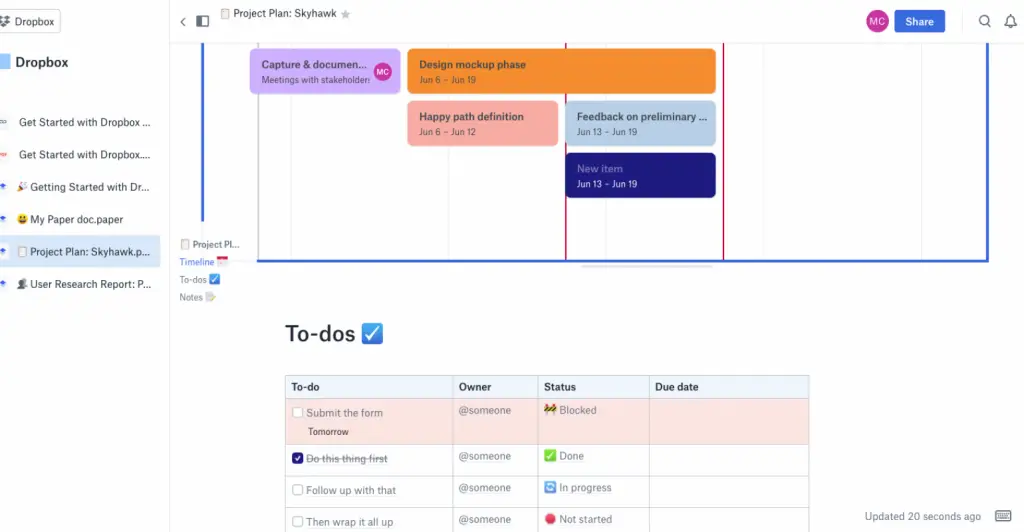
Summary
- Clean, distraction-free interface
- Synchronized editing and collaboration capabilities
- Integration with other Dropbox services
Dropbox Paper is a minimalist online document editor that focuses on providing a clean and distraction-free environment for collaborative writing.
With built-in synchronized editing and commenting features, Dropbox Paper makes it easy for researchers to work together without unnecessary distractions.
What are the pros and cons of Dropbox Paper?
✅ ✅ Pros
- Simple, distraction-free interface
- Synchronized editing and collaboration support
- Integration with other Dropbox services
❌ Cons
- Limited formatting options compared to other tools
- Requires an internet connection for full functionality
- Relies on a Dropbox account for use
Dropbox Paper is an excellent tool for researchers seeking a minimalist environment for collaborative writing. Its straightforward interface and synchronized editing features make it a great choice for focused document editing and sharing.
Source: https://www.dropbox.com/paper/start
#4. Overleaf: Best for Advanced Typesetting and LaTeX Collaboration

Summary
- Online LaTeX editor with built-in collaboration features
- Wide variety of templates and formatting options
- Integrated version control for tracking document changes
Overleaf is an online LaTeX editor designed specifically for collaborative document editing. With a vast array of templates and formatting options available, Overleaf is ideal for researchers who need to create professional-looking documents with precise typesetting.
The built-in version control system allows for easy tracking of changes and collaboration between multiple users.
What are the pros and cons of Overleaf?
✅ ✅ Pros
- Built-in collaboration features for LaTeX editing
- Comprehensive LaTeX formatting options and templates
- Integrated version control for tracking changes
❌ Cons
- Steeper learning curve compared to other document editors
- Requires an internet connection for full functionality
- Limited document storage for free accounts
For researchers who require advanced typesetting and formatting capabilities, Overleaf is the go-to choice. Its LaTeX collaboration features and extensive LaTeX support make it the perfect tool for creating polished, professional documents.
Source: https://www.overleaf.com/
#5. Authorea: Best for Streamlined Scientific Writing and Publishing Process
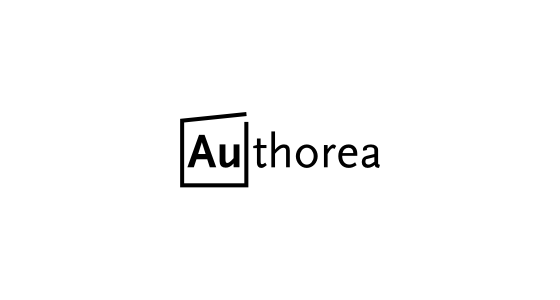
Summary
- Online document editor optimized for scientific writing and publishing
- Integration with citation management tools
- Export to various formats, including LaTeX and Microsoft Word
Authorea is an online document editor specifically designed for scientific writing and publishing.
With its built-in citation management tools and the ability to export to various formats, Authorea streamlines the research and writing process, making it easier for researchers to produce well-structured documents for publication.
What are the pros and cons of Authorea?
✅ ✅ Pros
- Optimized for scientific writing and publishing
- Integration with citation management tools
- Export to different formats, including LaTeX and Microsoft Word
❌ Cons
- Requires an internet connection for full functionality
- Limited free plan with storage and collaborators restrictions
- Steeper learning curve for non-scientific writers
Authorea is an excellent collaborative writing tool for researchers who want a streamlined solution for scientific writing and publishing. Its focus on scientific document creation combined with citation management tools makes it a valuable resource in the research process.
Source: https://www.authorea.com/
#6. Mendeley: Best for Collaboration through Reference Management and Networking
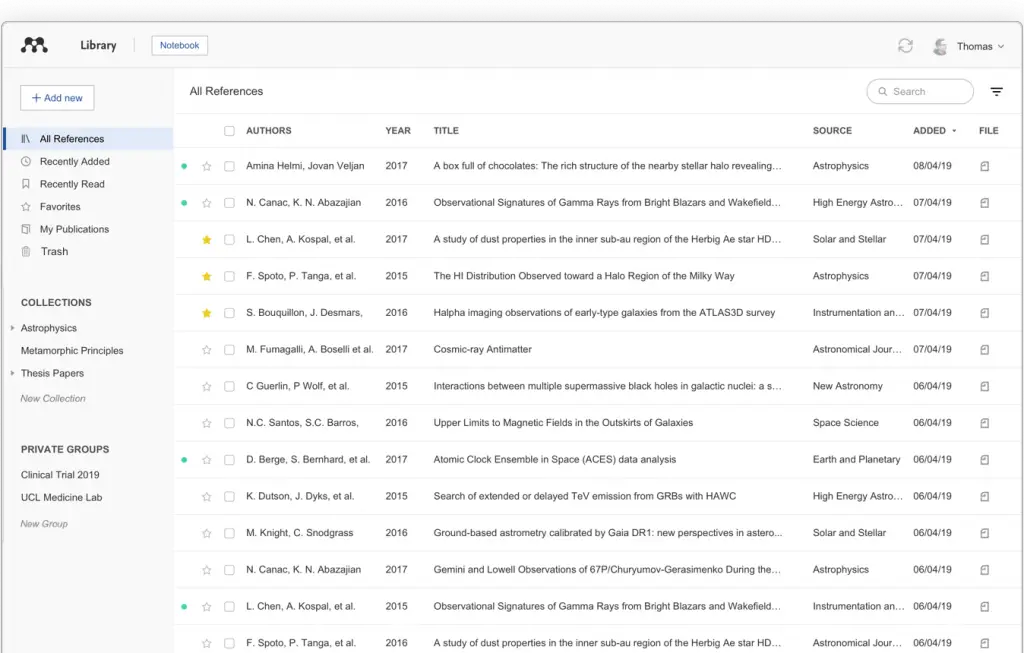
Summary
- Reference management software with collaborative features
- Integration with various citation styles and tools
- User-built research networks for collaboration and discovery
Mendeley is a reference management software that facilitates collaboration, research organization, and citation management.
With Mendeley, users can create reference libraries, collaborate with other researchers, and integrate their work with various citation styles and tools. The Mendeley platform also promotes research network building, allowing users to connect with others in their field.
What are the pros and cons of Mendeley?
✅ ✅ Pros
- Comprehensive reference management and citation tools
- Collaboration features integrated with reference organization
- Research network building for collaboration and discovery
❌ Cons
- Limited real-time editing capabilities compared to other tools
- Not specifically designed for direct document editing
- May require additional software for full document creation functionality
Mendeley excels in providing researchers with reference management and research network building tools. As a resource for organizing research materials, it is a top choice for those who need to manage and access multiple references.
Source: https://www.mendeley.com/?interaction_required=true
#7. EndNote: Best for Robust Citation Management and Library Sharing
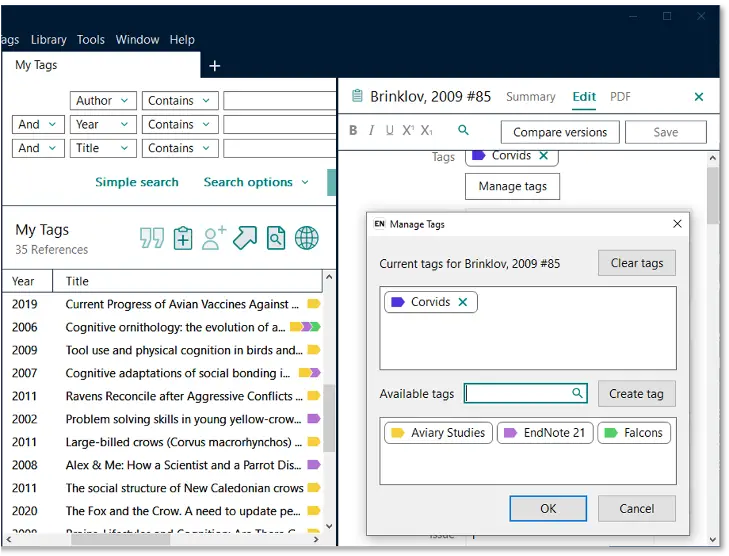
Summary
- Robust reference management and citation software
- Integration with various citation styles and tools
- Support for library collaboration and sharing
EndNote is a comprehensive reference management and citation software designed to simplify the research process.
With its robust set of tools and support for various citation styles, EndNote facilitates the creation of well-formatted documents and makes referencing a breeze. Its library collaboration and sharing capabilities make it useful for research teams.
What are the pros and cons of EndNote?
✅ ✅ Pros
- Comprehensive reference management and citation tools
- Extensive citation style integration and formatting options
- Library collaboration and sharing features
❌ Cons
- Not specifically designed for direct document editing
- Limited real-time editing capabilities compared to other tools
- Relatively high cost compared to other reference managers
EndNote is a powerful reference management tool that provides extensive citation and referencing capabilities for researchers. Its collaboration and sharing features make it an excellent choice for teams working on projects that require comprehensive referencing.
Source: https://endnote.com/
#8. Scrivener: Best for Managing Complex Writing Projects

Summary
- Feature-rich writing software for long-form projects
- Support for various output formats and templates
- Comprehensive organization and outline tools
Scrivener is a writing software designed specifically for long-form projects such as books, scripts, and dissertations. With its extensive organization and outlining tools, Scrivener facilitates the development and organization of complex writing projects, streamlining the writing process.
What are the pros and cons of Scrivener?
✅ ✅ Pros
- Designed for long-form writing projects
- Extensive organization and outlining tools
- Support for various output formats and templates
❌ Cons
- Limited collaboration features compared to other tools
- Higher price tag compared to some other collaborative writing apps
- Steeper learning curve due to extensive features
Scrivener is an excellent choice for researchers tackling large-scale writing projects. Its comprehensive organization and outlining tools make it a valuable resource for managing complex projects.
Source: https://www.literatureandlatte.com/scrivener/overview
#9. Etherpad: Best for Simplistic Approach to Text Collaboration

Summary
- Open-source, web-based text editor
- User-friendly collaboration and editing capabilities
- Simple, distraction-free interface
Etherpad is an open-source, web-based text editor that focuses on providing a user-friendly, real-time collaboration experience. Its simple interface allows users to easily collaborate on documents without unnecessary distractions.
What are the pros and cons of Etherpad?
✅ ✅ Pros
- User-friendly collaboration and document sharing
- Simple, distraction-free interface
- Open-source and customizable
❌ Cons
- Limited formatting options compared to other tools
- Requires an internet connection for full functionality
- Lacks more advanced document creation features found in dedicated writing application
Etherpad’s strength lies in its simplistic approach to collaborative text editing. With its uncomplicated interface and user-friendly collaboration features, it’s a great option for researchers who want to focus on the content of their documents rather than formatting and organization.
Source: https://etherpad.org/
#10. Zoho Writer: Best for Comprehensive Editing and Collaboration Suite

Summary
- One of the best online collaborative writing tools with a wide range of features
- Effortless collaboration and document sharing
- Integration with other Zoho productivity tools
Zoho Writer is an online document editor that offers a wide range of features and has effortless collaboration capabilities.
With its integration with other Zoho productivity tools, it provides an attractive option for researchers who are looking for a comprehensive solution for document editing and collaboration.
What are the pros and cons of Zoho Writer?
✅ ✅ Pros
- Comprehensive feature set for document editing
- Effortless collaboration and document sharing opportunities
- Integration with other Zoho productivity tools
❌ Cons
- Requires an internet connection for full functionality
- Limited free plan with storage and collaborators restrictions
- May have a steeper learning curve due to extensive features
Zoho Writer is an excellent tool for researchers who need a comprehensive document editor with collaboration features. The integration with other Zoho productivity tools adds value to the package, making it a strong contender for research collaboration.
Source: https://www.zoho.com/writer/
#11. iA Writer: Best for Clutter-Free Writing Experience
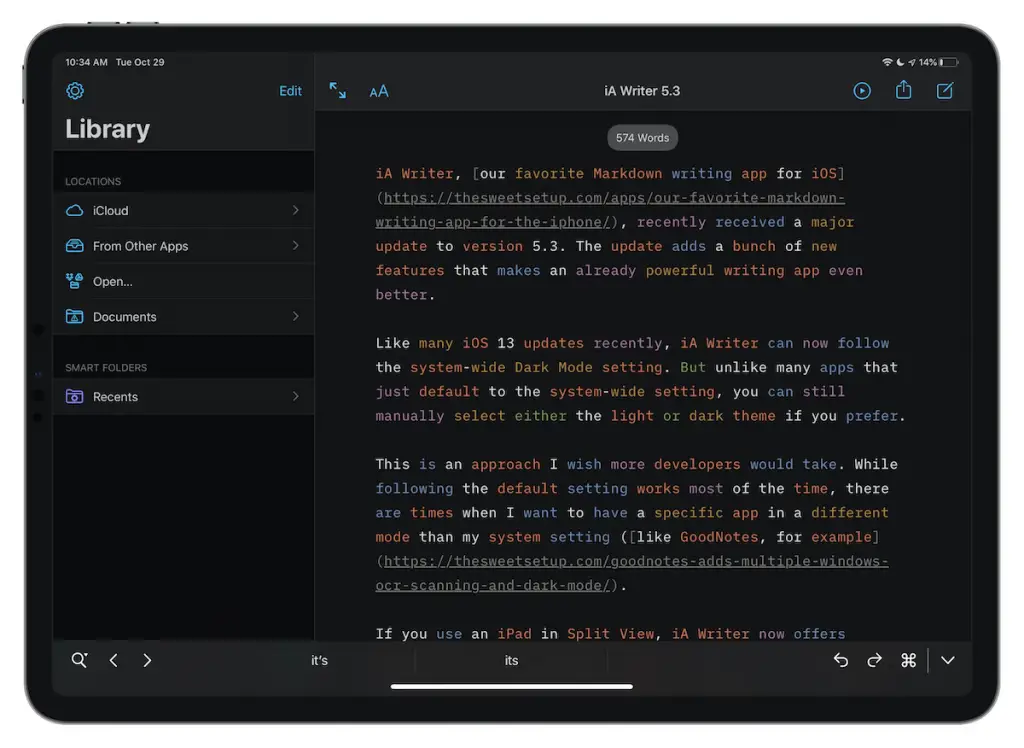
Summary
- Minimalist writing application with a focus on clutter-free writing
- Supports Markdown and plain text formats
- Cross-platform syncing capabilities
iA Writer is a minimalist writing application designed to provide a clutter-free writing experience. Supporting Markdown and plain text formats, iA Writer allows researchers to focus on their content without unnecessary formatting distractions.
What are the pros and cons of iA Writer?
✅ Pros
- Clutter-free, minimalistic interface
- Supports Markdown and plain text formats
- Cross-platform syncing capabilities
❌ Cons
- Limited collaboration features compared to other tools
- No real-time editing capabilities
- Limited formatting options
For researchers who prefer a minimalist writing application, iA Writer is an excellent choice. Its focus on clutter-free writing allows users to concentrate on their content without any unnecessary distractions.
Source: https://ia.net/writer
#12. Evernote: Best for Versatile Note-Taking and Research Organization
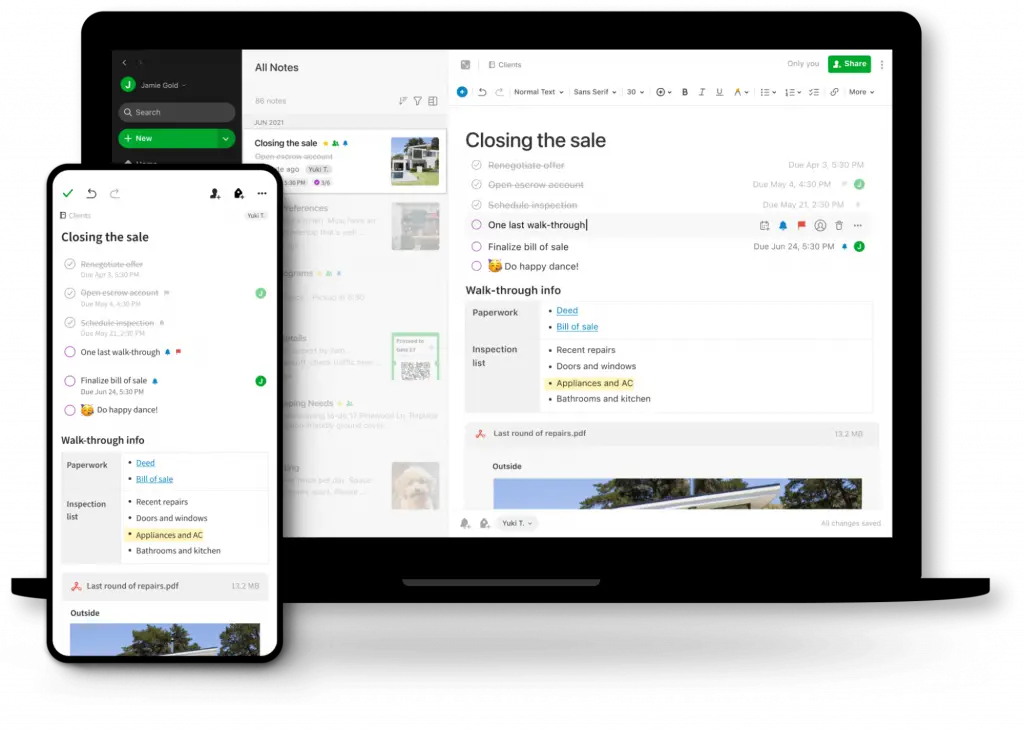
Summary
- Cross-platform note-taking application
- Powerful organizational features, including tagging and searching
- Supports various file formats and multimedia
Evernote is a powerful note-taking application that goes beyond simple text input. It offers multimedia support, allowing users to store images, audio, and other file formats.
Evernote’s tagging and searching capabilities make it an excellent tool for organizing research materials and keeping track of ideas and references.
What are the pros and cons of Evernote?
✅ Pros
- Cross-platform compatibility and syncing
- Advanced organizational features with tags and search functionality
- Supports multimedia and various file formats
❌ Cons
- Limited collaboration features compared to other tools on the list
- Requires an internet connection for full functionality
- Premium subscription needed for advanced features
While not specifically designed for collaborative writing, Evernote is an excellent tool for organizing research materials and notes. Its powerful organization features and support for multimedia make it invaluable for researchers who need to keep track of information and ideas.
Source: https://evernote.com/
#13. Manubot: Best for Transparent Scientific Manuscript Collaboration
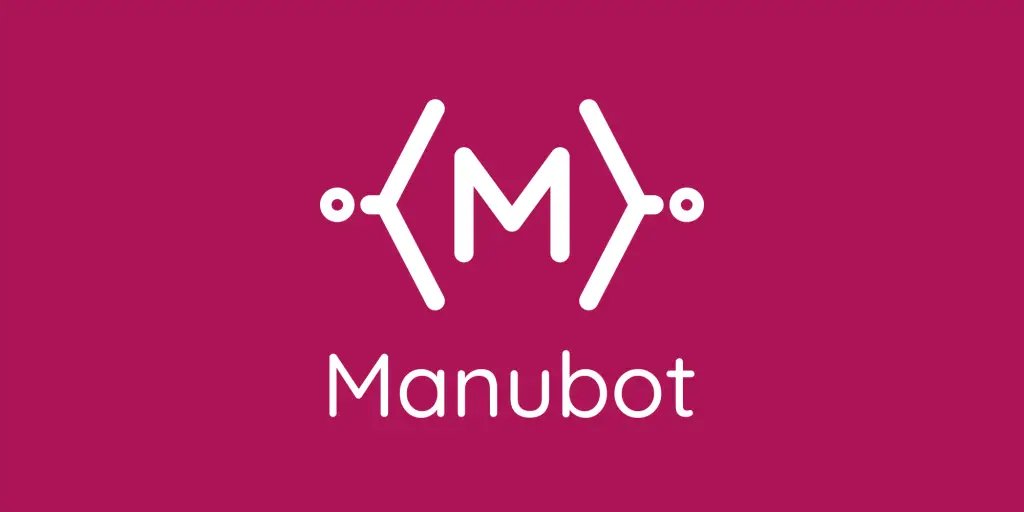
Summary
- Open-source tool for creating transparent scientific manuscripts
- Transparent authorship tracking and version control
- Supports various file formats, including Markdown and Jupyter notebooks
Manubot is an open-source tool designed specifically for creating transparent scientific manuscripts. It provides features for tracking authorship and maintaining version control, making it easier for research teams to collaborate on scientific publications.
What are the pros and cons of Manubot?
✅ Pros
- Designed for transparent scientific manuscript collaboration
- Transparent authorship tracking and version control
- Supports various file formats, including Markdown and Jupyter notebooks
❌ Cons
- Steeper learning curve compared to other tools
- Requires familiarity with Git and GitHub for full functionality
- Lacks real-time collaboration features found in other tools
Manubot is a powerful tool for researchers who want to create transparent scientific manuscripts with a collaborative approach. Its focus on authorship tracking and version control make it an excellent resource for collaborating on scientific publications.
Source: https://manubot.org/
#14. Fidus Writer: Best for Online Collaborative Academic Writing
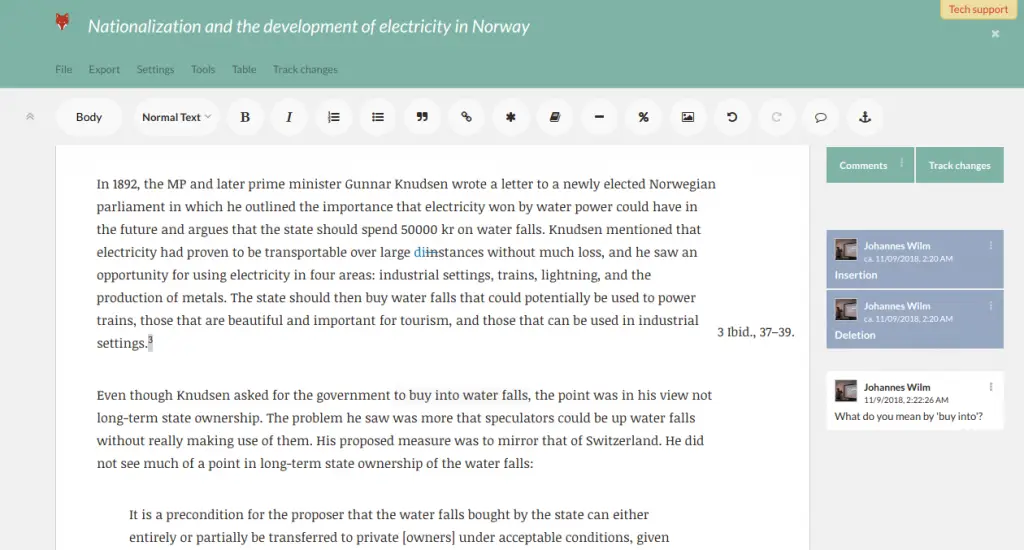
Summary
- Web-based editor designed specifically for academic writing
- Real-time collaboration features
- Built-in support for citations and bibliographies
Fidus Writer is an online editor designed specifically for academic writing. It offers real-time collaboration features, allowing researchers to work together on scholarly documents effortlessly.
Additionally, Fidus Writer has built-in support for citations and bibliographies, making it an excellent choice for academic writing projects.
What are the pros and cons of Fidus Writer?
✅ Pros
- Designed specifically for academic writing
- Real-time collaboration features for seamless teamwork
- Built-in support for citations and bibliographies
❌ Cons
- Requires internet connection for full functionality
- May have a learning curve for non-academic researchers
- Limited formatting options compared to more general-purpose writing tools
Fidus Writer is a powerful online platform specifically designed for collaborative academic writing.
Source: https://www.fiduswriter.org/
#15. Manuscripts.io: Best for Planning, Writing, and Publishing Academic Papers
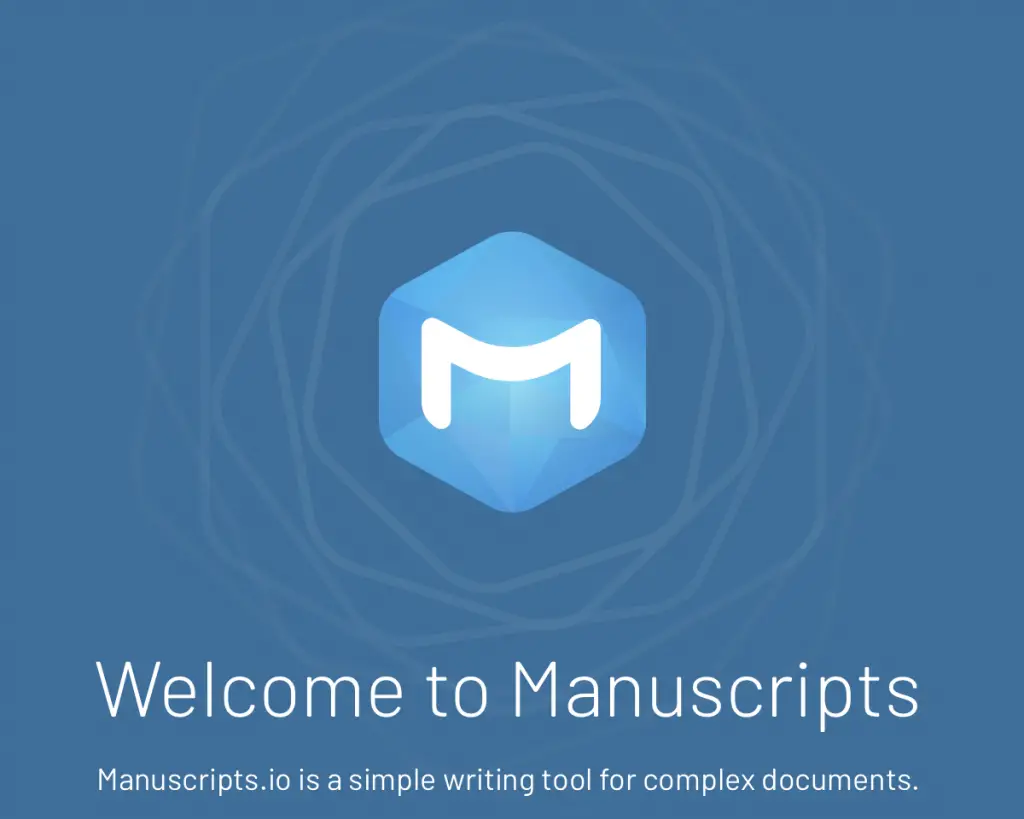
Summary
- Online platform for creating, collaborating, and publishing academic papers
- Supports manuscript planning, drafting, and finalizing stages
- Real-time collaboration and commenting features
Manuscripts.io is an online platform designed to facilitate the entire process of creating, collaborating, and publishing academic papers.
The platform supports manuscript planning, drafting, and finalizing stages, providing a comprehensive solution for academic writing projects. Manuscripts.io also supports real-time collaboration and commenting, ensuring seamless teamwork throughout the writing process.
What are the pros and cons of Manuscripts.io?
✅ Pros
- Comprehensive solution for planning, writing, and publishing academic papers
- Real-time collaboration and commenting features
- Supports a wide range of academic writing formats
❌ Cons
- Requires internet connection for full functionality
- May have a learning curve for non-academic researchers
- Limited formatting options compared to more general-purpose writing tools
This tool is a comprehensive solution for planning, writing, and publishing academic papers.
Source: https://www.manuscripts.io/about/
#16. ProWritingAid: Best for Improving Writing Style and Grammar
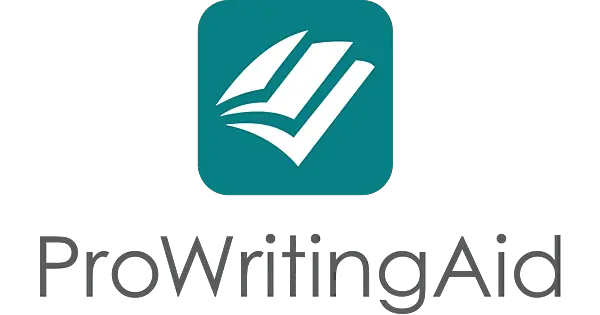
Summary
- Writing and editing tool designed to improve writing style and grammar
- Context-sensitive suggestions and feedback
- Integrations with popular writing platforms, including Microsoft Word and Google Docs
ProWritingAid is a writing and editing tool focused on improving writing style and grammar. It provides context-sensitive suggestions and feedback, helping writers produce refined, well-constructed documents.
ProWritingAid is compatible with popular writing platforms, including Microsoft Word and Google Docs, offering seamless integration with existing workflows.
What are the pros and cons of ProWriting Aid?
✅ Pros
- Helps improve writing style and grammar with context-sensitive suggestions
- Compatible with popular writing platforms
- Offers useful reports and analysis to identify areas for improvement
❌ Cons
- Not a standalone writing application
- Relies on an internet connection for full functionality
- Subscription-based pricing
ProWritingAid is a valuable resource for enhancing writing style and grammar across various platforms.
#17. Nuclino: Best for Team Collaboration and Knowledge Sharing

Summary
- Platform for creating collaborative documents, managing projects, and sharing knowledge
- Organize information using workspaces, boards, and lists
- Real-time collaboration and powerful search features
Nuclino is a collaboration platform that enables teams to create documents, manage projects, and share knowledge effectively. With a focus on organization, Nuclino utilizes workspaces, boards, and lists to help teams structure their information.
The platform supports real-time collaboration and features powerful search functionality, making it an excellent choice for team collaboration and knowledge sharing.
What are the pros and cons of Nuclino?
✅ Pros
- Streamlines team collaboration and knowledge sharing processes
- Provides organizational tools for structuring information
- Real-time collaboration and powerful search features
❌ Cons
- Not specifically designed for direct document editing
- Requires internet connection for full functionality
- Limited free plan with storage and collaborators restrictions
Nuclino is an efficient collaborative documentation tool adept at knowledge sharing and organization.
Source: https://www.nuclino.com/
#18. Byword: Best for MarkDown Lovers

Summary
- Minimalist writing application with a focus on Markdown
- Cross-platform compatibility and syncing features
- Export to various formats, including PDF, HTML, and Microsoft Word
Byword is a minimalist writing application specifically designed for those who love working with Markdown. Its simple interface and Markdown-specific features make it an attractive choice for those seeking a straightforward writing application.
Byword also offers cross-platform compatibility and syncing features, along with the ability to export documents to various formats, such as PDF, HTML, and Microsoft Word.
What are the pros and cons of Byword?
✅ Pros
- Minimalist writing application with a focus on Markdown
- Cross-platform compatibility and syncing features
- Export to various formats for flexible output
❌ Cons
- Limited collaboration features compared to other tools
- No real-time editing capabilities
- Relatively minimal formatting options
Byword is an excellent choice for Markdown lovers who appreciate a minimalist writing environment.
Source: https://bywordapp.com/
#19. XaitPorter: Best for Complex Collaborative Writing Projects
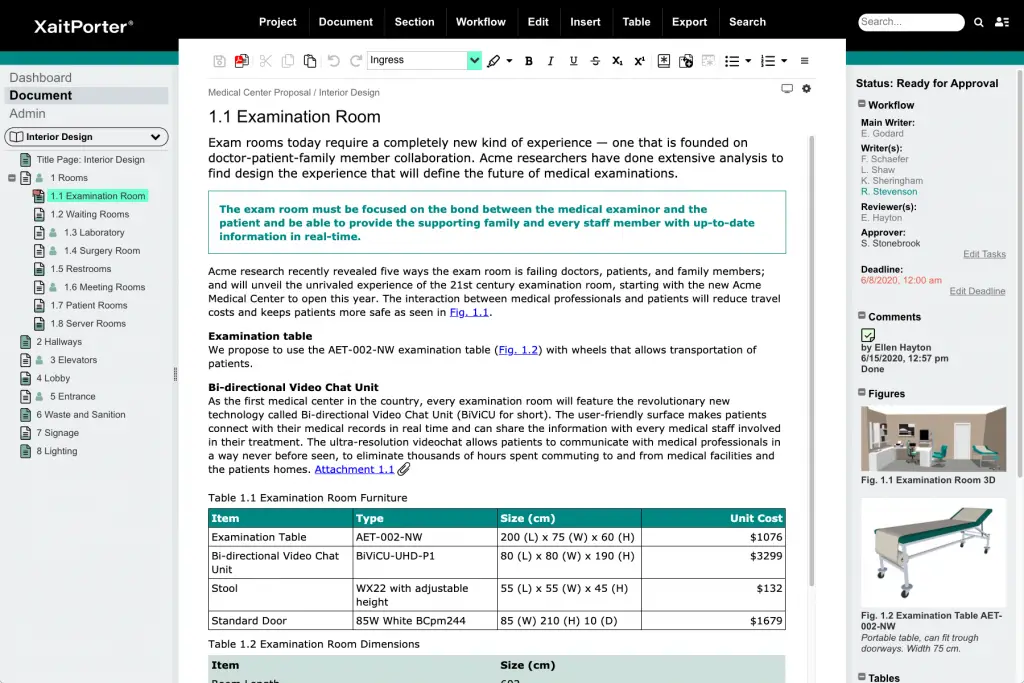
Summary
- Platform for managing complex collaborative writing projects
- Built-in workflow management and document approvals
- Supports collaborative editing and real-time updates
XaitPorter is a platform designed specifically for managing complex collaborative writing projects. With built-in workflow management and document approval features, XaitPorter helps teams streamline their writing process and ensure high-quality outputs.
The platform also supports collaborative editing and real-time updates, fostering seamless teamwork among team members.
What are the pros and cons of XaitPorter?
✅ Pros
- Designed specifically for managing complex writing projects
- Built-in workflow management and document approval functionalities
- Supports collaborative editing and real-time updates
❌ Cons
- Requires internet connection for full functionality
- Relatively high cost compared to other writing applications
- Steeper learning curve due to extensive features
This tool is outstanding for handling complex collaborative writing projects and streamlining the process.
Source: https://www.xait.com/xaitporter
#20. Draft: Best for Version Control and Editing Stages

Summary
- Online writing and collaboration tool with a focus on version control
- Supports editing, collaboration, and document organization
- Compare document versions and accept or reject changes
Draft is an online writing and collaboration tool that prioritizes version control. As a platform designed to facilitate the editing stages of the writing process, Draft enables users to collaborate on documents, organize their work, and track changes effectively.
By comparing document versions, users can accept or reject changes, ensuring the final document is polished and accurate.
What are the pros and cons of Draft?
✅ Pros
- Focus on version control and editing stages
- Supports editing, collaboration, and document organization
- Compare document versions and accept or reject changes
❌ Cons
- Requires internet connection for full functionality
- Limited formatting options compared to more general-purpose writing tools
- Lacks more advanced document creation features found in dedicated writing applications
Draft is a strong tool that emphasizes version control and editing stages in the writing process.
Source: https://www.becomeawritertoday.com/draft-review/
#21. WriterDuet: Best for Scriptwriting and Screenplays
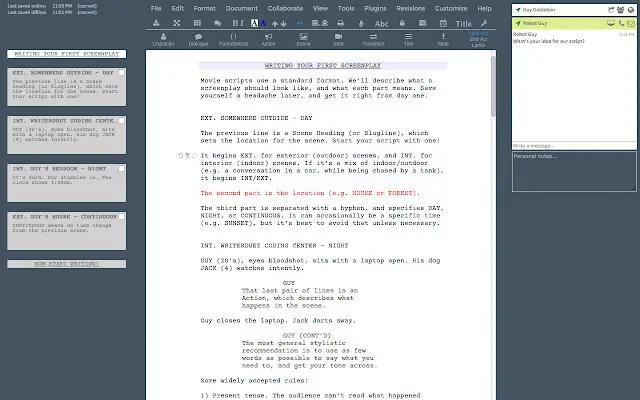
Summary
- Online platform for collaborative scriptwriting and screenplays
- Real-time collaboration and document editing features
- Professional formatting tools and export options
WriterDuet is an online platform designed specifically for collaborative scriptwriting and screenplays. With its real-time collaboration and document editing features, WriterDuet streamlines the process of scriptwriting for teams.
The platform also offers professional formatting tools and export options, ensuring scripts meet industry standards.
What are the pros and cons of WriterDuet?
✅ Pros
- Designed specifically for collaborative scriptwriting and screenplays
- Real-time collaboration and document editing features
- Professional formatting tools and export options
❌ Cons
- Requires internet connection for full functionality
- May have limited appeal to non-scriptwriting researchers
- Subscription-based pricing
WriterDuet is a top-notch editor designed for scriptwriting and screenplays, with a focus on collaboration.
Source: https://www.writerduet.com/
#22. HackMD: Best for Shared Markdown Notes
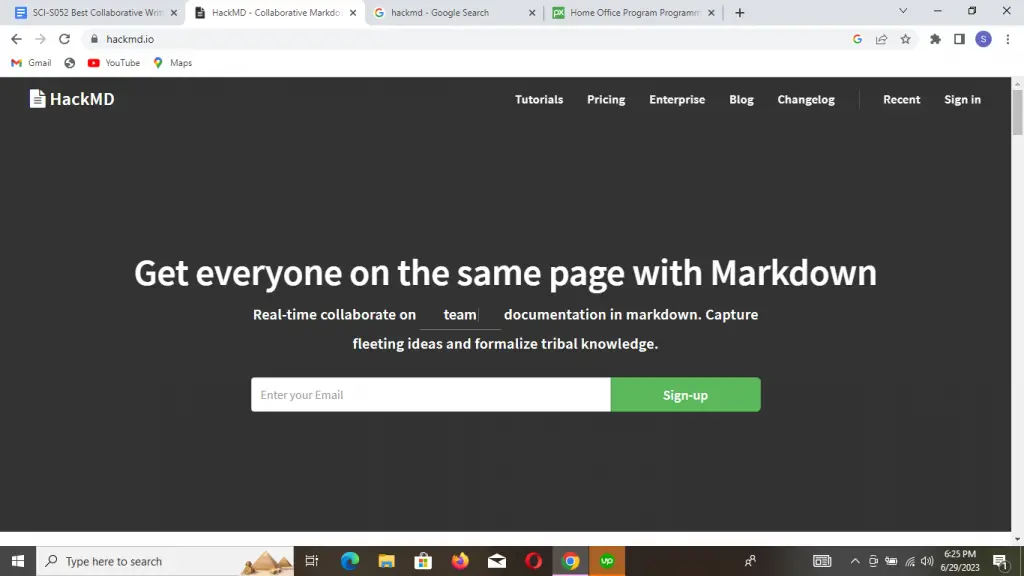
Summary
- Collaborative Markdown editor for creating and sharing notes
- Real-time collaboration features
- Supports various export formats, including PDF, HTML, and Microsoft Word
HackMD is a collaborative Markdown editor designed for creating and sharing notes. Its real-time collaboration features allow users to work together on documents seamlessly.
HackMD also supports exporting notes to various formats, including PDF, HTML, and Microsoft Word, providing flexibility for users.
What are the pros and cons of HackMD?
✅ Pros
- Collaborative Markdown editor for creating and sharing notes
- Real-time collaboration features
- Supports various export formats for flexible output
❌ Cons
- Requires internet connection for full functionality
- Limited formatting options relative to more general-purpose writing tools
- Lacks more advanced document creation features found in dedicated writing applications
HackMD is an exceptional editor for creating, sharing, and collaborating on Markdown notes.
Source: https://hackmd.io/
#23. Penflip: Best for Version-Controlled, Collaborative Writing
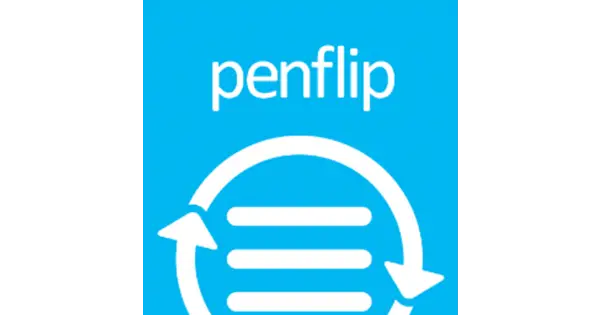
Summary
- Online platform for collaborative writing with a focus on version control
- Supports editing, collaboration, and organization of documents
- Utilizes Git-based version tracking and editing feature
Penflip is an online platform for collaborative writing projects with a focus on version control. By providing editing, collaboration, and document organization features, Penflip helps teams manage their writing projects effectively.
The platform utilizes Git-based version tracking and editing features to ensure a seamless writing and editing experience.
What are the pros and cons of Penflip?
✅ Pros
- Focus on version-controlled collaborative writing
- Supports editing, collaboration, and document organization
- Utilizes Git-based version tracking and editing features
❌ Cons
- Requires internet connection for full functionality
- Limited formatting options compared to more general-purpose writing tools
- Requires familiarity with Git-based version control systems
This platform shines in version-controlled, collaborative writing and Git-based features.
Source: https://www.crunchbase.com/organization/penflip
#24. Ulysses: Best for Writing, Organizing Drafts, and Exporting to Various Formats
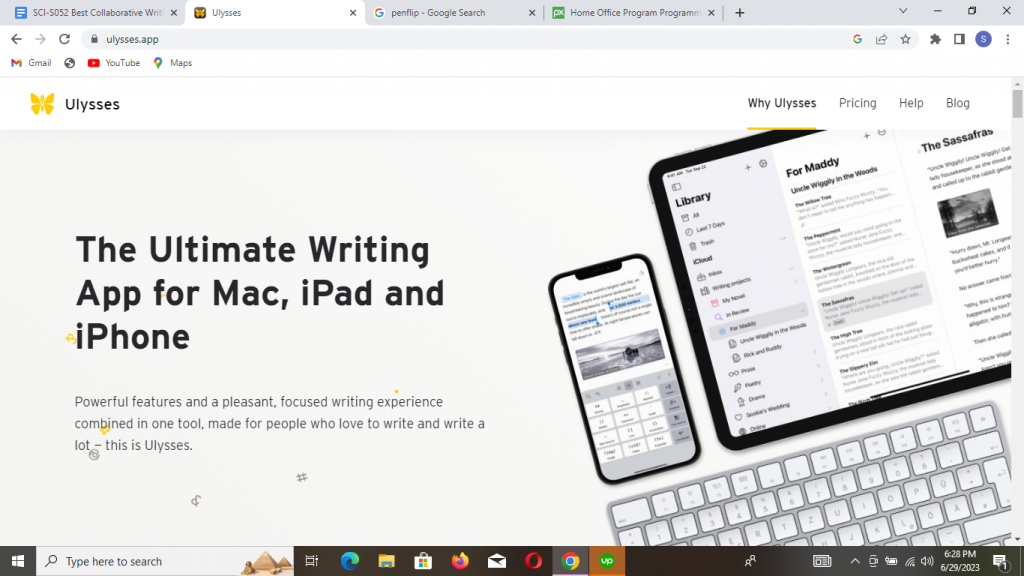
Summary
- Writing application for managing and organizing drafts
- Supports various export formats, including PDF, EPUB, and Microsoft Word
- Distraction-free writing environment with Markdown support
Ulysses is a writing application designed to help users write, organize drafts, and export their works to various formats.
With its distraction-free writing environment and support for Markdown, Ulysses helps writers focus on their content while maintaining an organized workspace. The application supports exporting to various formats, including PDF, EPUB, and Microsoft Word.
What are the pros and cons of Ulysses?
✅ Pros
- Designed for managing and organizing drafts of documents
- Supports various export formats for flexible output
- Distraction-free writing environment with Markdown support
❌ Cons
- Limited collaboration features compared to other tools
- No real-time editing capabilities
- Subscription-based pricing
Ulysses is a robust writing tool adept at organizing drafts and exporting to multiple formats.
Source: https://ulysses.app/
#25. Notion: Best for Versatile Workspaces, Combining Databases, Notes, and Tasks
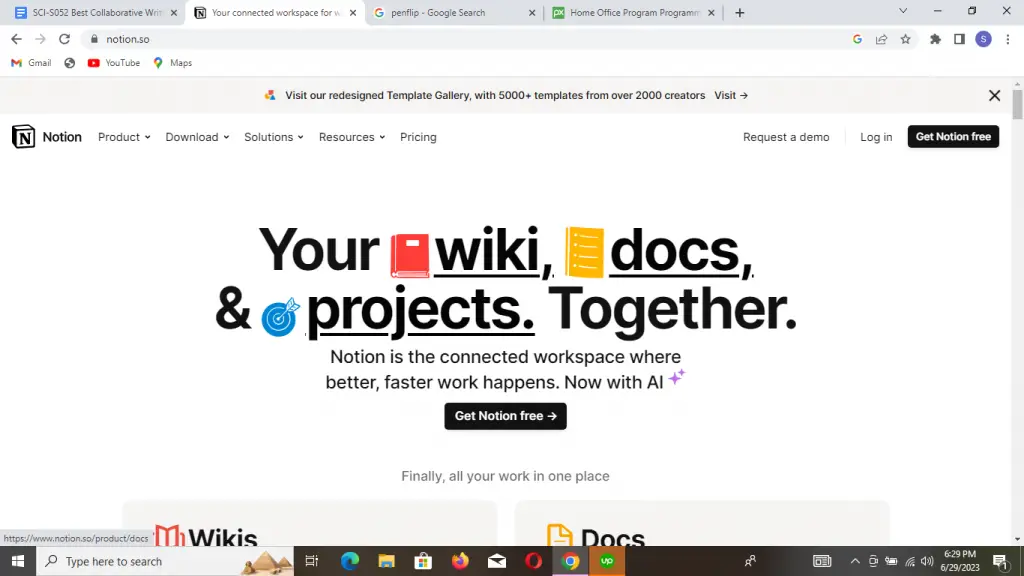
Summary
- All-in-one workspace for managing databases, notes, tasks, and more
- Real-time collaboration features
- Highly customizable and adaptable to various workflows
Notion is an all-in-one workspace designed for managing databases, notes, tasks, and other project-related information. With its real-time collaboration features, Notion enables teams to work together seamlessly.
Highly customizable, Notion can be configured to meet the specific needs of various workflows, making it an excellent choice for versatile, adaptable workspaces.
What are the pros and cons of Notion?
✅ Pros
- All-in-one workspace for versatile project management
- Real-time collaboration features
- Highly customizable and adaptable to various workflows
❌ Cons
- Requires internet connection for full functionality
- Limited free plan with storage and collaborators restrictions
- May have a learning curve for novice users, due to the abundance of features
This tool excels in version-controlled, collaborative writing, but may prove difficult for users unfamiliar with Git.
Source: https://www.notion.so/
Conclusion
We’ve explored 25 top-notch collaborative writing tools, each tailored to support distinct writing needs. They’re uniquely designed to facilitate seamless cooperation and efficient project management.
But leveraging technology doesn’t stop here. Take your writing to the next level by also exploring AI writing tools. Check out our review on the best AI writing tools, which unveils how AI can revolutionize your writing process. Let’s continue embracing the future of writing.


